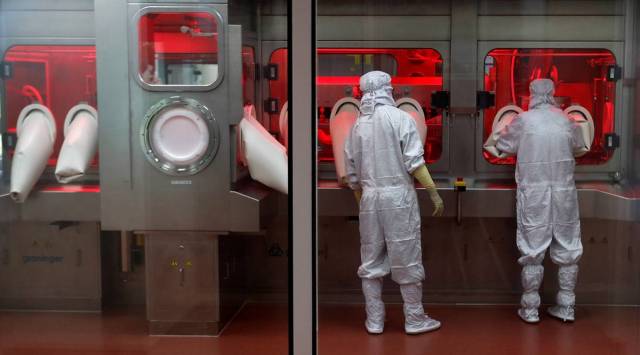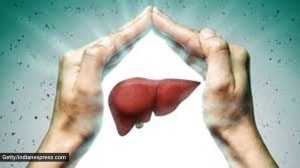- India
- International
On adverse reaction claim from Chennai, Centre says no need to stop vaccine trial
In its first public remarks over the notice, the government said that it has no role to play in such claims filed anywhere in the country. “ICMR has no role in endorsing or not endorsing a legal claim filed anywhere in the country,” Union Health Secretary Rajesh Bhushan said.
 The Serum Institute of India is manufacturing and testing Oxford/AstraZeneca's coronavirus vaccine in the country (Reuters)
The Serum Institute of India is manufacturing and testing Oxford/AstraZeneca's coronavirus vaccine in the country (Reuters)UNDERLINING THAT several checks are in place to track adverse reactions reported in clinical trials for the Covid vaccine candidate being developed by Serum Institute of India (SII), the Centre Tuesday said its initial assessment “did not necessitate stoppage” after a Chennai-based trial participant sought compensation of Rs 5 crore from the Pune company for suffering a “severe adverse reaction”.
In its first public remarks over the notice, the government also said that it has no role to play in such claims filed anywhere in the country. “ICMR has no role in endorsing or not endorsing a legal claim filed anywhere in the country,” Union Health Secretary Rajesh Bhushan said.
ICMR chief Dr Balram Bhargava said the initial assessment conducted by the regulator on the basis of documents sent to it by independent monitoring bodies “did not necessitate stoppage of these trials”.
ICMR and SII are the Indian partners of the vaccine being developed by Oxford University and AstraZeneca. On Sunday, SII had said the trial participant’s allegation was “malicious”, his medical condition was not linked to the vaccine trial, and that it would seek damages of Rs 100 crore.
Also Read | Despite affordable Covid-19 vaccine likely by Feb 2021, 59% say they won’t rush to take it

“What is important to remember is that adverse events do occur with drugs, vaccines, or any other health intervention. It is the role of the regulator, after collating all data, to ascertain or refute whether there is a causal link to the event and the intervention. So that causal link, whether it has to be ascertained or refuted, has to be done by the DCGI (Drugs Controller General of India)…This is done purely on a scientific basis and the assessment is done with objectively based criteria,” Bhargava said.
The Health Secretary said the first of several measures put in place for monitoring the trial is the “prior informed consent form” listing the possible adverse events, which a subject has to sign. “This is a global practice… without the signature of the subject, he or she cannot participate in a clinical trial,” Bhushan said.
Also Read | Govt hasn’t spoken of vaccinating entire country: Health Secy
“Second, these vaccine trials are multi-centric and multi-site; the subjects are given the vaccine under medical care, they are monitored and observed. Every site has an institutional ethics committee, which is independent of the sponsors and government. Whenever there is an adverse event, the ethics committee takes note of it and gives its findings…to the regulator within 30 days,” he said.
Bhushan said the Data Safety and Monitoring Board (DSMB), “that is independent of the government and the vaccine manufacturer” and consists of domain knowledge experts, “also monitors the clinical trial on a day-to-day basis”. “They also report such adverse events. They can also recommend if they decide to temporarily halt the trial or conduct an investigation,” he said.
“Four… the rules state that whenever there is an adverse event, a Form-5 has to be filled by the Chief Investigator and the report is submitted to the regulator,” he said. The ethics committee and the DSMB also examine the report to find out “if there is one-to-one correlation between the adverse event and the vaccination. Only after the regulator examines all of these reports sent by different bodies, it gives a go-ahead for the trials,” he said.
Explained: What is the emergency use authorisation drugmakers are seeking for Covid-19 vaccine?
“In the present case, Serum Institute’s vaccine trial’s clubbed phase 2/3 and phase 3 permission has been given based on examination of these documents… The adverse event being referred to in case of the vaccine developed by Oxford-Serum happened in October. All these five processes, please don’t assume, have not been complied with,” Bhushan said.
Asked if the government endorses the move by SII to claim Rs 100 crore in damages, the Health Secretary said: “In normal circumstances, vaccine development usually takes 8-10 years. But given the size and the impact of the pandemic, we are trying to crash that timeline into 16-18 months…when you have this context, there is a potentiality that commercial interest would dictate certain strategic actions on part of commercial entities. Governments of the day have nothing to do with it.”
Bhushan also said that guidelines will soon be issued to states on how to communicate with the population on the need for a vaccine, and “vaccine safety”.
Apr 19: Latest News
- 01
- 02
- 03
- 04
- 05






































